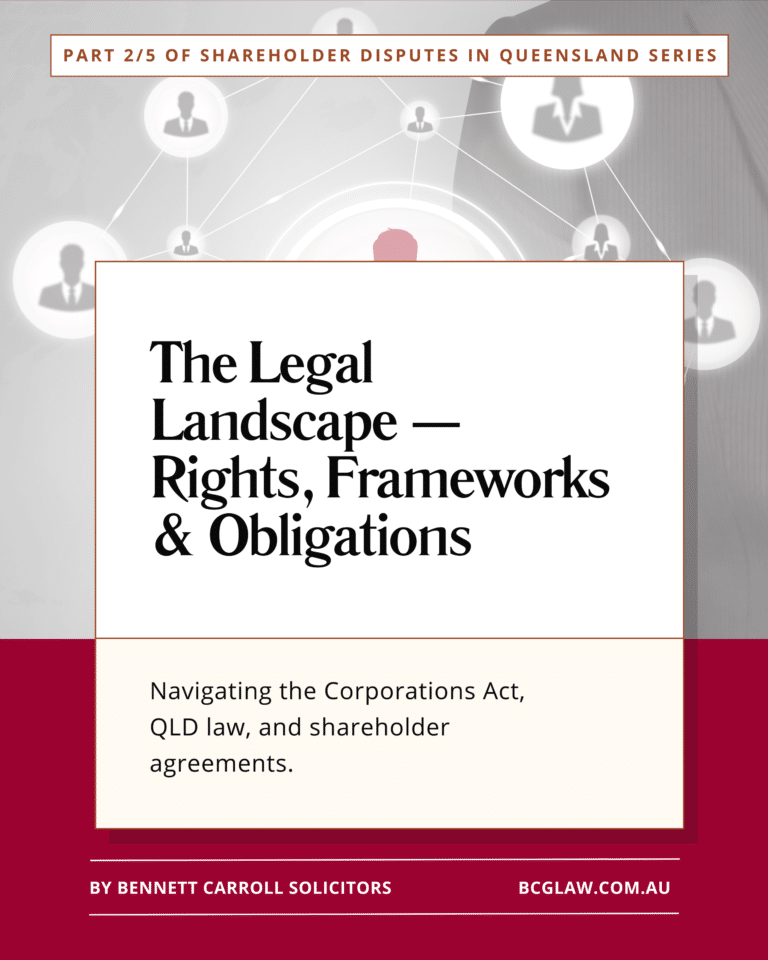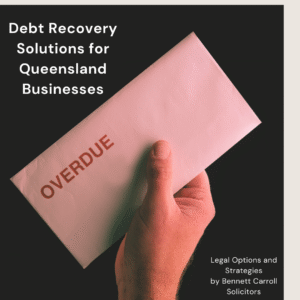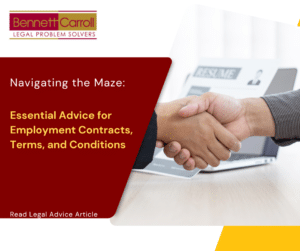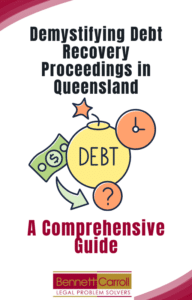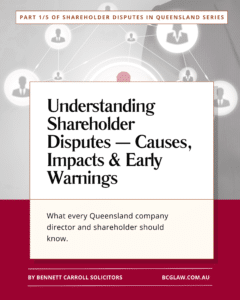Welcome to Part 2 of our 5-Part Legal Guide on Shareholder Disputes in Queensland.
In this series, we will explore the key aspects of shareholder disputes, with a focus on private companies in Queensland. Whether you’re a business owner, shareholder, or legal professional, understanding the common causes, legal frameworks, and resolution strategies for these disputes is essential for the stability and success of your business.
Explore the full series on Shareholder Disputes in Queensland:
Part 1: Causes, Impacts & Early Warnings
Part 2: Legal Frameworks & Shareholder Rights
Part 3: Prevention Strategies
Part 4: Dispute Resolution & Stakeholder Strategies
Part 5: Practical Tips & Recent Developments
Legal Framework for Shareholder Disputes in Queensland
Shareholder disputes in Queensland operate within a complex legal framework governed by federal legislation, state laws, company constitutions, and shareholder agreements.
Corporations Act 2001 (Cth)
The Corporations Act 2001 serves as the primary legislation governing companies in Australia, including Queensland. This federal law provides several important mechanisms for addressing shareholder disputes:
The oppression remedy under sections 232-234 allows shareholders to seek relief when company affairs are conducted in a manner that is oppressive, unfairly prejudicial, or unfairly discriminatory against shareholders. This is one of the most commonly used remedies in shareholder disputes.
Statutory derivative actions under sections 236-242 permit shareholders to bring legal proceedings on behalf of the company when those in control fail to do so, particularly in cases involving breaches of directors’ duties.
Section 461 provides grounds for winding up a company in circumstances where it is “just and equitable” to do so, which can be relevant in deadlocked companies or where there has been a fundamental breakdown in shareholder relationships.
Queensland Legislation and Court System
While the Corporations Act provides the main legal framework, Queensland’s court system plays a crucial role in resolving shareholder disputes. The Supreme Court of Queensland has jurisdiction to hear corporate disputes, including those between shareholders.
Queensland courts encourage alternative dispute resolution methods before proceeding to trial, with case appraisal and mediation being the two main ADR types available through the Queensland Courts. “Queensland Courts encourages parties to use alternative dispute resolution (ADR) methods to resolve their disputes and reach agreement themselves. This allows them to avoid the expense, time and conflict of a trial,” according to the Queensland Courts website.
Company Constitution and Shareholder Agreements
A company’s constitution operates like a contract between the company, its directors, and its shareholders. It establishes the rules for company operations, including procedures for meetings, decision-making processes, and the rights and obligations of shareholders.
Shareholder agreements serve as valuable tools for preventing and resolving disputes by outlining specific procedures for dispute resolution, such as mandatory mediation or arbitration before litigation. These agreements can also establish mechanisms for addressing common issues like share transfers, management changes, and deadlock situations.
Rights and Obligations of Shareholders in Private Companies
Understanding the fundamental rights and obligations of shareholders is essential for navigating disputes effectively.
Basic Shareholder Rights
Shareholders in Australian private companies possess several key rights protected by law. Voting rights allow shareholders to participate in major company decisions, including appointing or removing directors, approving substantial transactions, and amending the company’s constitution.
Financial rights entitle shareholders to a portion of the company’s profits through dividends, distributions, share buybacks, and other mechanisms. Information access rights permit shareholders to inspect certain company records, including the company register, and to receive financial reports under specific circumstances.
As ASIC explains, “If you own shares in a proprietary company (i.e., one that has ‘P/L’ or ‘Pty Ltd’ at the end of its name) you have certain rights, including the right to get information about the operation of the company and the right to request the company hold meetings of members (subject to certain conditions)”.
Obligations and Limitations
While shareholders possess various rights, they also face certain obligations and limitations. Shareholders must comply with the company constitution and any shareholder agreements they have entered into. They must also adhere to relevant laws and regulations governing shareholder conduct.
Unlike directors, shareholders generally do not owe fiduciary duties to the company or other shareholders. However, majority shareholders may sometimes have obligations not to exercise their power oppressively against minority shareholders.
Next > Part 3: Preventing Shareholder Disputes — Strategies for Stability | Shareholder Disputes in Queensland Series
Concerned about potential disputes? Contact Bennett Carroll Solicitors for expert legal advice on shareholder conflicts in Queensland. Our expert Commercial Lawyers are here to assist you. With offices across Brisbane, Gold Coast, Sunshine Coast, and Ipswich, we’re ready to help. Contact Bennett Carroll Solicitors today.
External resources:
- ASIC: Resolving Company Disputes
- Australian Government – Business Dispute Resolution
- Alternative dispute resolution- Queensland Courts Website
- Disputes about your rights as a proprietary company shareholder


